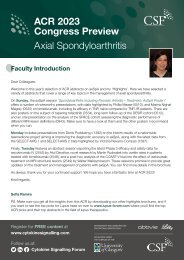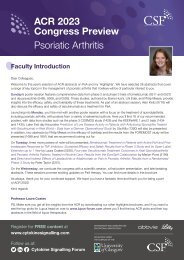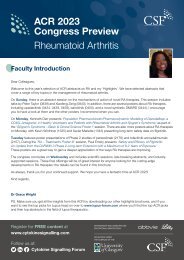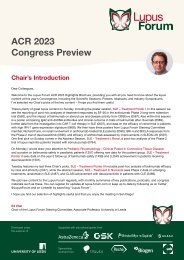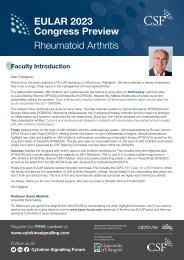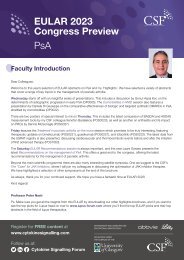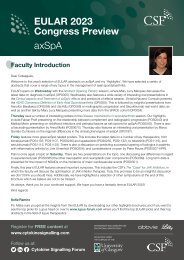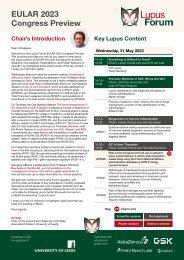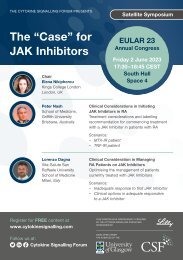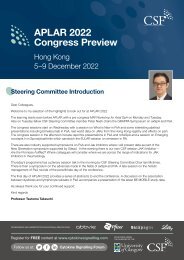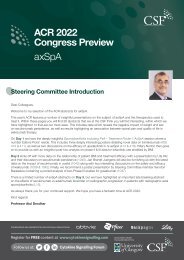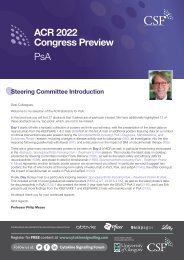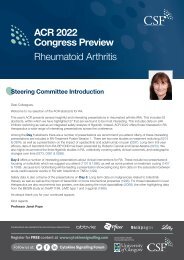ACR Congress Review 2019
Create successful ePaper yourself
Turn your PDF publications into a flip-book with our unique Google optimized e-Paper software.
In summary, individually, high baseline levels of key inflammatory serum cytokines, as well as the<br />
presence of a low sICAM1/CXCL13 ratio, were each indicative of positive outcomes in bDMARD-IR RA<br />
patients treated with filgotinib [46*].<br />
Finally, Taylor and colleagues presented results of an RNA sequencing study that examined the value of<br />
baseline gene expression for predicting therapeutic response to filgotinib in patients from FINCH2.<br />
Baseline Rodriguez-Carrio IFN signature score showed no significant association with Week 12 clinical<br />
response (P>0.05 for all comparisons). In contrast, the baseline FINCH2-derived composite IFN-based<br />
signature was significantly associated with an increase of DAS28-CRP after 12 weeks (P=0.0026),<br />
independent of treatment. The composite IFN-based signature score was significantly associated with a<br />
filgotinib-specific improvement in DAS28-CRP (100 mg, P=0.0045; 200 mg, P=0.0005) and <strong>ACR</strong>-N<br />
responses (100 mg, P=0.036) after 12 weeks. The authors concluded that IFN signalling alone is not<br />
sufficient to predict response to MTX in a bDMARD experienced population. However, an expanded<br />
FINCH2-derived composite IFN signature demonstrated a treatment-specific significant association at<br />
Week 12 [2012].<br />
Effect of filgotinib on cholesteryl ester transfer protein levels in RA patients<br />
Di Paolo and colleagues presented findings on the in vitro profiles of JAKis as evaluated using human<br />
cell-based assays and pharmacokinetic-pharmacodynamic models. Filgotinib 100 and 200 mg resulted<br />
in lower calculated cellular inhibition than the other JAKis at clinical exposures. Notably, filgotinib 100 mg<br />
and 200 mg were calculated to reduce cholesteryl ester transfer protein (CETP) expression by 17.3%<br />
and 27.4%, respectively. Baricitinib, tofacitinib, and upadacitinib did not alter CETP levels. These results<br />
provide a potential mechanistic link to the observed reduction of CETP concentration and activity<br />
following filgotinib treatment, and the associated observed reduction in LDL:HDL in RA patients [59*].<br />
Peficitinib<br />
Interim results of peficitinib a long-term open-label extension study<br />
Takeuchi and colleagues presented the interim results of a long-term open-label extension study of<br />
peficitinib (NCT01638013) conducted in Japan, Korea and Taiwan. Patients who had previously<br />
completed Phase 2b or Phase 3 studies (RAJ1/3/4) received oral peficitinib (50, 100 or 150 mg) once<br />
daily. Starting dose was 100 mg (RAJ3/4) or 50 mg (RAJ1). Doses could be increased to 150 mg/day or<br />
reduced (from 100 mg/day or 150 mg/day) to 50 mg/day according to clinical response and safety<br />
assessment, as judged by the investigator. A total of 843 patients received peficitinib (RAJ1, n=201;<br />
RAJ3, n=225; RAJ4, n=417) with a mean treatment exposure of 22.7 months. During long-term<br />
treatment, <strong>ACR</strong>20 responses were maintained from baseline for patients receiving maximum doses of<br />
100/150 mg/day and were improved then maintained in patients receiving maximum doses of<br />
50 mg/day. <strong>ACR</strong> components and DAS28-CRP also demonstrated continuous improvements from the<br />
baselines of preceding studies. TEAEs were reported in 89.8% of patients and were primarily grade 1/2<br />
in severity; the most common were nasopharyngitis, RA and herpes zoster. Rates of AEs of special<br />
interest (serious infections, herpes zoster-related disease and malignancies) were greater for patients<br />
from RAJ3/4 than RAJ1. There was no evidence to support a trend towards increasing incidence<br />
rate/100 patient years with treatment duration. One death during and one death after the study were<br />
considered probably and possibly related to study drug, respectively. The authors concluded that no<br />
additional safety concerns were observed with longer term administration of peficitinib in RA patients,<br />
and efficacy was maintained for the study duration [508].<br />
*Chairman’s Pick



